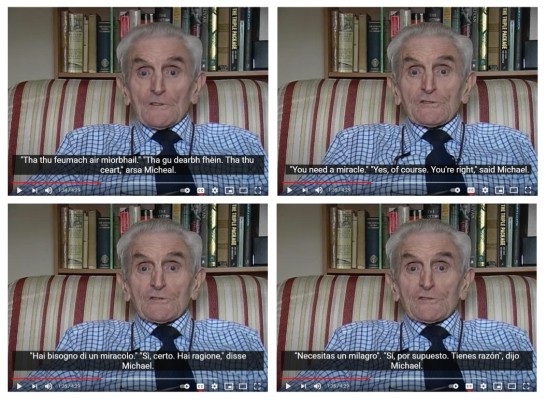 Maggie Smith, from Achmore on Lewis, has been doing a power of work collecting and recording Gaelic stories and poetry around and about Lewis for a number of years, many of them curated on her own website, and reproduced on the Island Voices page dedicated to her work. Nor has lockdown stopped her, as she reveals in this conversation with Pàdruig Moireach conducted over Zoom.
Maggie Smith, from Achmore on Lewis, has been doing a power of work collecting and recording Gaelic stories and poetry around and about Lewis for a number of years, many of them curated on her own website, and reproduced on the Island Voices page dedicated to her work. Nor has lockdown stopped her, as she reveals in this conversation with Pàdruig Moireach conducted over Zoom.
This is a new and experimental departure for the Stòras Beò nan Gàidheal team, seeking to make a virtue out of necessity. Indeed, in some ways community recording work may become easier as more and more of us get accustomed to using technology to overcome physical barriers. If this works well, we can expect more of this kind of material in the months to come.
In the first part, Maggie talks about early childhood memories and stories of Glasgow where she was born, though her Achmore roots go back many generations. Returning home she recalls the kind of upbringing island children of her age received, in which community links and mutual responsibilities were strong. Grandparental stories from work experience in Patagonia, and snatches of Spanish at the fank guarded against cultural introversion. She recalls her schooling, and the impact of television’s arrival on cèilidh culture, with traditional work on the land noticeably falling off in the 80s, particularly after oil work began.
A wordlinked transcript, with the video embedded, is available on Clistore here: https://multidict.net/cs/9169
In the second part Maggie and Pàdruig talk about trends in island work patterns over the years. The advent of the Arnish yard led to skills development opportunities for men across Lewis, which many later put to use in openings around the world. Weaving was a traditional occupation, frequently practised in combination with other jobs. Even as a schoolchild Maggie was accustomed to fitting her schoolwork into other duties, such as fetching water for the house. After a short spell working in Inverness after school, she returned to work with the family haulage firm for many years, before branching out into media work, tourism and other projects.
A wordlinked transcript, with the video embedded, is available on Clilstore: https://multidict.net/cs/9170
In the third part Maggie talks more about her cultural activity in the community, including community drama based on locally sourced stories, and the collection of local poetry. Moving to Zoom during lockdown has created a new platform for locals to share stories and for incomers and Gaelic learners to learn about the culture, recreating old communities and gathering new people. She also talks about the power of music and song in working with older people at risk of memory loss, and of collecting fishermen’s stories, mostly in Gaelic. The conversation ends with a discussion of changes that have come over Achmore and the use of Gaelic in the community.
A wordlinked transcript, with the video embedded, is available on Clilstore: https://multidict.net/cs/9171
 Retired policeman Alec MacAulay recounted this story in 2014 of his raider father’s bold exploits on coming back home to Uist from the First World War. Returning soldiers across the islands were in no mood for undue deference to the landowning classes, and were taking crofting matters into their own hands, with strong popular support.
Retired policeman Alec MacAulay recounted this story in 2014 of his raider father’s bold exploits on coming back home to Uist from the First World War. Returning soldiers across the islands were in no mood for undue deference to the landowning classes, and were taking crofting matters into their own hands, with strong popular support.

 Calum Alasdair Fraser, from Tolastadh a’ Chaolais, talks to Maggie Smith about his family connections and upbringing on the west side of Lewis.
Calum Alasdair Fraser, from Tolastadh a’ Chaolais, talks to Maggie Smith about his family connections and upbringing on the west side of Lewis.






